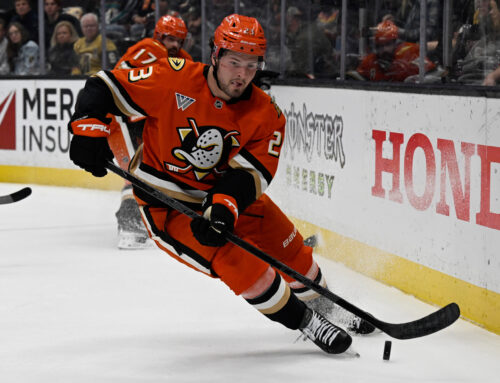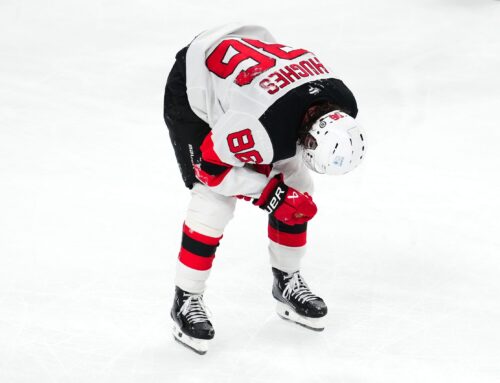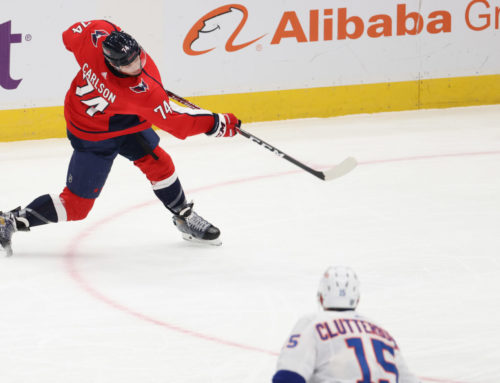
Recap of Pens/Bolts, scoring chance numbers from this year, Artemi Panarin, and some eulogies.
****
Though the final score of 4-2 for Pittsburgh looks fairly close, and the score for most of it was, this game was a showcase for how good the Penguins are.
You know, there is a lot that can be said about playoff officiating. Too soft at times, “let the players play”, and so on and so forth. The first period of this game was scoreless, but was incredibly exciting end-to-end action at times. There was one penalty. This was the penalty:
— Stephanie (@myregularface) May 19, 2016
This was assuredly not the most/only extralegal play of the period. So it goes.
The second period was also a pretty fast-paced period from both sides, at least to start. Before delving into that, this is one of the coolest things I’ve ever seen at a sporting arena:
The Lightning played GIANT MARIO KART on the ice during a game break (via @emptynetters) https://t.co/CPQrbLQRVY pic.twitter.com/qJW5JhszGg
— SB Nation NHL (@SBNationNHL) May 19, 2016
Tampa had a few chances, including a Brian Boyle post, in the second, but it was largely carried by the Penguins, especially after the first five minutes or so. There was a shift late in the second where the Penguins cycled for what seemed about 30 seconds, got in a full change without the puck leaving the zone, got in another full shift, forced Tampa to ice the puck, and then had most of the next shift. It seemed like the puck was in Tampa’s end for a full two minutes, and the only time the puck left the zone was on that icing.
It was just a matter of time before the Penguins scored, and Carl Hagelin did just that, potting a rebound off a Phil Kessel shot with just 10 seconds left in the second period.
Kessel and Tyler Johnson would trade goals in the third period, but the insurance came with just over nine minutes left when Crosby slapped home a 4-on-3 goal for a 3-1 lead. It was just desserts, as the Penguins controlled most of this game. Chris Kunitz put the game out of reach with the fourth goal.
Andrei Vasilevskiy was the difference between a one-goal game half-way through the third period and a laugher. It’ll be interesting to see what the Bolts do in the offseason. Not that I really think they trade Ben Bishop, but Vasilevskiy looks to be a pretty sure thing (as far as goalies are concerned). Bishop’s trade return would help bolster an already pretty good roster.
I am drafting Vasilevskiy next year. At worst, it should be 20 starts behind a very good team. At best, maybe he eventually takes the job. As a fourth goalie, he’s worth the price.
****
The narrative surround Artemi Panarin’s Calder Trophy bid consists of two aspects: He played with Patrick Kane – the likely MVP – and he was a 24-year old rookie. As for the latter aspect: those are the rules. As for the former aspect, I find it curious the tunnel vision that is going on here.
Think of it like this:
Kane had his most productive season ever, totalling 106 points, or 18 more points than in any other previous season (88 in 2009-2010). He had not produced more than 73 points in any of his other six 82-game seasons.
There is no doubt that playing with Kane helped Panarin produce the most points of any rookie since 2007. With that said, considering the season that Kane just had, it shouldn’t be discounted that Panarin helped Kane as well.
When playing alongside Panarin, Kane managed 2.57 points per 60 minutes at five-on-five. That mark represents Kane’s highest mark since the aforementioned 2009-2010 season. (Note: for the season this year, Kane was at 2.62 points/60 overall, but over half his time not spent with Panarin was up on the Toews line). Also, Kane had his highest points rate while at five-on-four in his career (7.55 points/60 minutes at five-on-four, via Hockey Analysis) Any guess which was, by far, the most used forward combination for the Blackhawks by time on ice, at 5v4?
.png)
That graphic was from Corsica Hockey.
Kane’s season was marked by high shooting percentages all around, and I wouldn’t expect him to get to 106 points again next year. Similarly, I’m not sure that Panarin is a point-per-game player next year, either. All the same, while it is fair say Panarin’s production was aided by his line mate, it’s not pure coincidence that Kane just happened to have a career year, either. Chemistry is a two-way street.
****
The research has begun for next season, or at least, the review of last season. One area that has sort of come to the forefront over the last couple of seasons thanks to War On Ice is high-danger scoring chances (all at five-on-five).
War On Ice’s glossary contains the definition of a high-danger scoring chance. The relevant picture is below:
.png)
What is relevant here is that the area just in front of the net shaded in teal produces a value of ‘3’, the red areas around it are ‘2’, and the outside areas are ‘1’.
As for what qualifies as a high-danger scoring chance (HDSC), these are their criteria:
- Any shot that qualifies as a grade ‘3’ shot or higher.
- For that, we first determine the area that was taken, and give it the appropriate value of 1, 2, or 3 as was just outlined.
- Add ‘1’ if it was a rebound or rush shot. A rebound shot is any shot within three seconds of a shot attempt from your team, or within four seconds of an event in another zone.
- Subtract ‘1’ if it was a blocked shot.
So an unblocked, non-rebound or non-rush shot from the green area is high-danger. So is a rush shot, or a rebound, from the red area. Make sure to re-read all this if it isn’t clear, and go read the definition I linked earlier as well for further clarification.
The point of this is that high-danger scoring chances are where the highest rate of goals are scored. For example, New Jersey this past year, starting from high-danger and moving to low-danger, shot 8.9-percent, 4.2-percent, and 1.3-percent. It makes sense intuitively, yes, but it hasn’t been that long that we’ve been able to quantify this with a uniform definition of a scoring chance.
Below are some of the individual high-danger scoring chance producers that jumped out at me from last year (again, all from War On Ice).
Hertl
Tomas Hertl led the league – Tomas Hertl led the league – in individual high-danger scoring chances (iHSC) at five-on-five. No doubt that this is due, in large part, to playing alongside Joe Thornton, but that is astounding to me. In fact, over the last three years, he leads the Sharks in this regard with 283 iHSC, 33 more than Joe Pavelski. In 46 fewer games than Pavelski, no less.
I suspect Hertl will be alongside Thornton again next year. Put him on a watch list for a 25-30 goal player next year.
Lee
Inside the top-10 of the NHL this year was Anders Lee, and I’m sure that would surprise a lot of people who drafted him last year. Lee fell from 25 goals in 2014-2015 to just 15 this year, despite playing four more games.
This should probably dispel the notion that he was solely a product of John Tavares. His shooting percentage three years ago in a brief 22 game sample was 12-percent at five-on-five (a bit high). Two years ago, it was 10.4-percent (still a tad high). Last year, it cratered to 4.4-percent. Playing with Tavares would help, but I would wager a lot of money that if Lee is top-10 in iHSC again next year, he doesn’t shoot 4.4-percent at five-on-five, regardless of his centreman.
Zucker
Jason Zucker finished inside the top-20 players in iHSC last year. More reason to draft him next year, along with this.
Smith
Finishing just inside the top-15 was Craig Smith. I found that interesting.
Smith is one of 33 players that has scored at least 20 goals in each of the last three seasons. Looking over the rest of the list, every other player is probably being drafted inside the top-100, or thereabouts. I seriously doubt Smith will be.
With a full season of Ryan Johansen, Filip Forsberg coming into his prime, and James Neal still one of the top dozen or so goal scorers in the NHL, I have to think that Smith’s 16 assists improve next year (an 82-game career-low for him). He still hasn’t had one of those “career years” and will not cost much at the draft table. He helps drive the play, he typically takes a lot of shots, and should be playing in a very talented top-six. Smith’s name is another one that should be on watch lists for next season as a depth pick, particularly in roto leagues.
Zibanejad
There were 46 forwards with 20+ goals, 30+ assists, and at least two shots per game last year. One of them was Mika Zibanejad, who also set a career-high with 21 goals. It seems like he’s been around forever, but next year will be Zibanejad’s Age 23 season, or about his scoring prime.
As long as the Senators bring back Mike Hoffman, there is a fair amount of scoring talent among their top-six wingers. Zibanejad has his problems defensively, but with a healthy Kyle Turris playing the tough minutes next year, this could a player pushing 55 points next year.
One caveat here would be that we’ll see how Zibanejad plays under the new regime. Will he have free reign offensively? Will actual structured play cause a downgrade offensively? There is no way to know right now. Zibanejad finished inside the top-35 in iHSC, though, which is certainly a good sign moving forward.
Those are just a few names that jumped out to me among the league leaders. There are reasons as to why these guys have high numbers, and that’s for further analysis. But don’t eschew players like Lee who may have had a down year last year when the underlying numbers show that they could (should) have produced at a much higher rate. That just means they very well could next year, and will come at a draft discount.
****
I don’t know if anyone reads the eulogies over at Puck Daddy, but they are absolutely priceless. The one yesterday came at the expense of the Nashville Predators.
To be sure, if there are certain keywords blocked by your employer, these are definitely not safe for work. Also, the humour contained in most of them is not for everyone. It may not be your cup of tea, and that’s fine. We don’t all have the same sense of humour.
All the same, I’ve been reading these for a few years, and 80-percent of them are very good. Keep in mind that these eulogies are roast-styles, so fans of a particular team are almost assured to be offended. They are worth the five minutes, though.
For my money, the best one so far these playoffs has been on the Dallas Stars.
****
There are a lot of fantastic resources out there for hockey. Having really only got into the analytics side five or six years ago, the availability and quality of information between then and now is absolutely absurd. War On Ice was mentioned earlier, as was Hockey Analysis. And, of course, the Dobber Frozen Pool tools are excellent resources that seem to get better and more in-depth with each passing month.
There were upgrades done at Own The Puck and the HERO charts. The one below if for Tyler Seguin:

It now shows a composite WOWY (with out/with you stats, for line mates), or how the player affects possession/expected goals. It shows goal scoring, primary assists, primary points (goals and primary assists), shot generation/suppression, and expected regression along with the reliability of this regression. I encourage readers to go through them. It really helps visualize just how effective each player is in important predictive stats. Some players may surprise you.
*Stats from Hockey Reference, Hockey Analysis, War On Ice, and Corsica.
8 Comments
Leave A Comment
You must be logged in to post a comment.





 MTL
MTL
 PIT
PIT FLA
FLA S.J
S.J CGY
CGY MIN
MIN NSH
NSH

I thought it was With Or Without You. It makes me think of the song.
Within You, Without You from Sgt. Pepper
I want to play in a league that uses advanced stats!
It would be really cool to play in a league that uses something like relative corsifor instead of plus/minus.
Great stuff, Mike. If people want an edge on their competitors, they need to have a strong understanding of iHSC, 5v5SH%, HDSV%, PP% and the like. These summer ramblings are a great place to learn. Keep it up!
I thought it was Which One Would You…
Anyone else looking for a crosby and malkin assist on the kuntz goal. Home points do exist. They both would have gotten assists if the game was in Pittsburgh.
I remember them saying on the broadcast that they determined there was a change of possession, hence no assists. I found it odd as well.